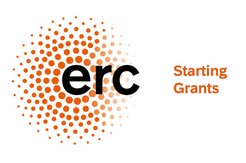Prestigious ERC funding for 20 Max Planck researchers
The European Research Council (ERC) awards 20 Starting Grants to the Max Planck Society, ten of them to female researchers

The recipients are exploring diverse topics such as the effects of three-dimensionality on quantum nanomaterials, health disparities between immigrants and native populations in aging societies, and the mechanisms of nuclear self-assembly.
Each of the 20 young researchers from all three Sections of the Max Planck Society receive an average of 1.5 million euros for their exceptional work. This funding will enable them to provide additional support to their research groups for five years and encourage them to launch independent projects with their own teams to pursue their innovatiIve research ideas.
Proportion of top female researchers on the rise
The proportion of female researchers receiving ERC Starting Grants has been steadily increasing since the ERC's inception in 2007. This year, 43 percent of total grants have been awarded to female scientists (up from 39 percent last year). At Max Planck, the rate for funded female scientists is even higher, at 50 percent.
In a European comparison, the Max Planck Society ranks first, alongside the French CNRS, with 20 grants each. The Helmholtz Association and the Hebrew University of Jerusalem follow in second place with 10 grants. Third place goes to the Technical University of Munich with 9 grants acquired.
The most successful host organizations in Europe come from Germany, with 87 grants, followed by France with 50 grants and the Netherlands with 44 grants. Out of a total of 2,696 applications submitted across Europe, 400 were approved, with funding totalling 628 million euros this year. The ERC Starting Grants are part of the EU's research and innovation program, Horizon Europe.
This year's ERC Starting Grants go to:
Humanities and social sciences
Silvia Loi - Immigrant-native health disparities in aging societies: an intersectional approach
MPI for Demographic Research in Rostock
Biology, medicine
Aydan Bulut-Karslioglu - Propagation of cellular memory through dormancy
MPI for Molecular Genetics in Berlin
Lukas Groschner - Temporal processing in Drosophila melanogaster
MPI for Biological Intelligence in Planegg-Martinsried
Katharina Höfer - Conjugation of NAD-capped RNAs to proteins by ADP-ribosyltransferases to generate RNA therapeutics
MPI for Terrestrial Microbiology in Marburg
André Marques - How to evolve without centromeres: meiotic recombination dynamics in holocentric plants
MPI for Plant Breeding Research in Cologne
Bonnie J. Murphy - Development of Reconstructed Electron Energy Loss techniques for Elemental Mapping in macromolecular structures
MPI of Biophysics in Frankfurt/Main
Aukje Marieke Oudelaar - Shedding light on three-dimensional gene regulation
MPI for Multidisciplinary Sciences in Göttingen
Eric Schulz -Towards Artificial Cognitive Science
MPI for Biological Cybernetics in Tübingen
Ágnes Tóth-Petróczy - Evolution of Biomolecular Condensates
MPI for Molecular Cell Biology and Genetics in Dresden
Alexander von Appen - Mechanisms of nuclear self-assembly
MPI for Molecular Cell Biology and Genetics in Dresden
Chemistry, physics, technology
Ricard Alert - The Spectrum of Fluctuations in Living Matter
MPI for Physics of Complex Systems in Dresden
Marin Bukov - Nonequilibrium Many Body Control of Quantum Simulators
MPI for Physics of Complex Systems in Dresden
Laura Classen - Emergence in quantum materials:from relativistic quantum criticality to nonFermi liquids and unconventional superconductivity (German only)
MPI for Solid State Research in Stuttgart
Claire Donnelly - Three Dimensional Quantum Nanomaterials
MPI for Chemical Physics of Solids in Dresden
Sandra Eibenberger-Arias - Coherent Control of Chiral Molecule
Fritz-Haber-Institut of the MPG in Berlin
Flore Kunst - New Trends of Non-Hermitian Topology in Open and Correlated Quantum Systems
MPI for the Science of Light in Erlangen
Giulio Malavolta - Code Obfuscation in a Quantum World
MPI for Security and Privacy in Bochum
Aditya Parthasarathy - A Gamma-ray Infrastructure to Advance Gravitational Wave Astrophysics
Max Planck Institute for Radio Astronomy in Bonn
Niels Schröter - Spin-momentum locking and correlated phenomena in chiral topological materials
MPI for Microstructure Physics in Halle
Giacomo Valtolina - Light for controlling Reactive Interactions in Cold molecules
Fritz-Haber-Institute of the MPG in Berlin












